When the Communist Party came to power in 1949, China rapidly turned into a state that spread terror throughout the world. Its policies based on violence and pressure have continued unabated since those early days. Communist ideology's unfeeling and ruthless conduct towards people and its materialist views that turn relationships between people into purely mechanical intercourse, has led to a ruthless and cruel government instead of a compassionate and just one.
In the communist China established by Mao Tse Tung the belief that order and stability can only be maintained by means of fear and violence prevails. As a result, the state tightly controls all aspects of individuals' lives and ruthlessly punishes anyone it deems appropriate. It is not just citizens who commit serious crimes in China that are punished. The Chinese state even arrested women who sent newspaper cuttings to their husbands abroad, accusing them of disclosing Chinese state secrets.1 It can accuse someone who gave what would appear to be a perfectly harmless quote to a foreign journalist of committing treason and send him to a labor camp. It is perfectly understandable that under conditions such as these fear and insecurity should prevail instead of peace, security, and stability. In the same way that it is not possible to talk about feelings such as love, self sacrifice and compassion in such a social structure, so it is also out of the question to speak of democracy and human rights. Chinese citizens are unable to criticize freely mistakes by the government or freely express their thoughts, and as a result they are unable to effectively push for change or renewal. The fate of those who try is usually a sufficient deterrent.
No matter how much the Western media cite the liberal reforms being carried out in the economy and the claim that China is turning to democracy, the Red Chinese government does not have the slightest intention of giving up its total control over the people. Those living in Chinese territory are the proof, and the peoples of both China and East Turkestan are now the major targets of these ruthless practices.
The People's Republic of China is a totalitarian regime. Its entire executive and legislative bodies are tied to one single administrative organ, the Chinese Communist Party. Nationally and locally, the major leaders in the police, the army, and civilian organizations are all the Communist Party administrators. Such people are often as influential after their retirement as they are while in office. As a result of their powerful organization, the Communist Party controls just about all aspects of life. For this reason, it is difficult to deviate from communist ideology in political and social life. Each individual's thoughts, beliefs, and actions must be in line with communist ideology and the instructions of the party. Deviation, and even the possibility of deviation, can be heavily punished.
The British journalist John Mirsky, who has become an expert on China, describes that communist rule in the following terms:
… But to them [Communist Party], stability meant an order in which the elders and the Communist Party were incontestably in charge. Any threat to that would have to be met with what they wielded most effectively: force.2
 |
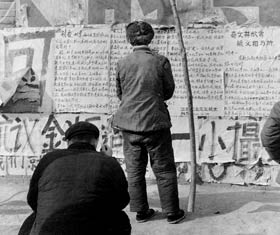 |
| Mao's Cultural Revolution led to savagery, the like of which has seldom been seen anywhere before. The revolution's particular targets were educated individuals and intellectuals. The young people known as the Red Guards killed, often by torture in full public view, people who failed to carry Mao's Little Red Book with them or who had not learned communist anthems by heart. In that period walls were covered with the copies of the Red Book to ensure that people read its content. |
The most striking example of this occurred during Mao's "Great Leap Forward" and the "Cultural Revolution" campaigns. Ruthless and cruel methods were resorted to in order to make the people submit to communism and translate communist ideology into daily life. Peasants were deliberately left to starve until they handed over their produce to communes and accepted the communist interpretation of production. Those who opposed communism at a time when that practice cost millions of lives were inevitably eliminated. During the Cultural Revolution, which was aimed at the educated and intellectual sections of society, all voices of opposition in China were silenced in the cruelest possible manner. The Cultural Revolution began with Mao's instruction that "There are still people at the highest levels of the state who have not fully turned to communism, and these need to be educated." This instruction became a campaign in which educated people were humiliated, beaten and tortured, and even killed for trivial justifications such as not wearing the uniform expected by Mao, or for being unable to learn communist marching songs by heart. Mao eventually got what he wanted, and communism finally completely entered peoples' minds. (For more detail on the savagery experienced during the Mao period, see Harun Yahya Communism in Ambush, Global Publishing, Istanbul, 2003).
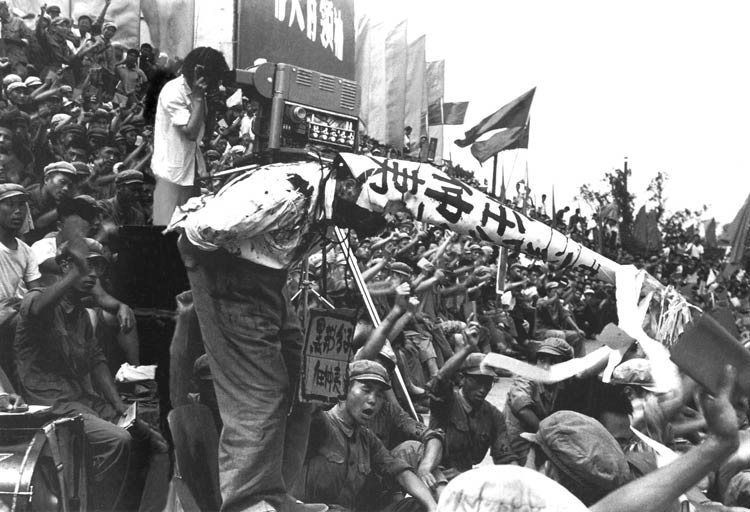 |
| During the Cultural Revolution, tens of thousands of teachers, politicians and artists were tortured and killed by the Red Guards. Often good public servants were destroyed in the process. This First Party secretary is just one of the thousands of people to have insulting placards hung around their necks and be publicly humiliated. |
This regime of oppression, which has lasted since Mao first established it in 1949 until the present day, has been maintained by virtue of the wide-reaching organization of the Communist Party. In such an environment, where there is almost one plain-clothed police officer for every five to ten people, and where everyone has come to be an informer on everyone else, the Communist Party has maintained its authority with force and violence. That is why right from the start a ruthless police force and army were established. The People's Armed Police (PAP) and the People's Liberation Army (PLA), attached to the State and Public Security Ministry, assumed this responsibility. Ever since the day it was set up the PLA has operated as the armed wing of the Communist Party, and is today the largest army in the world, with 6 million members.
In the following chapters of this book, we shall be considering examples of the repression and torture inflicted on the Muslims of East Turkestan. We shall also be looking at the Chinese administration's oppression of its own people. We will show that ruthlessness is a normal policy tool, and cruelty is regarded as nothing out of the ordinary. In societies where the existence of Allah is denied, where people believe that they have no other responsibility than to themselves, and where there is no belief in the hereafter, selfishness, ruthlessness and cruelty take the place of love, compassion, forgiveness, and sympathy.
The surest way of putting an end to the cruelty and torture is for people of good conscience to explain religious morality as part of their duty of enjoining good and forbidding evil, and invite others to learn about the teachings of Allah. In one verse of the Qur'an, Allah has also revealed that "Let there be a community among you who call to the good, and enjoin the right, and forbid the wrong. They are the ones who have success." (Surah Al ‘Imran: 104). In carrying out that important duty, one important stage of the war of ideas is the total exposure of all aspects of anti-religious ideologies and the destruction of their very foundations in order that proper morality may come to replace them. In the case of East Turkestan and China, that ideology is communism.
According to communist ideology, matter is all that exists and all events, historical, economic and sociological included, are nothing but reflections of different forms of matter. This view holds that everything is in a constant process of change and development. The force behind the change is conflict. The entire universe, including human history, has developed as a result of conflict, which has, in turn, led to human progress. (see Communism in Ambush by Harun Yahya, Global Publishing, Istanbul, 2003)
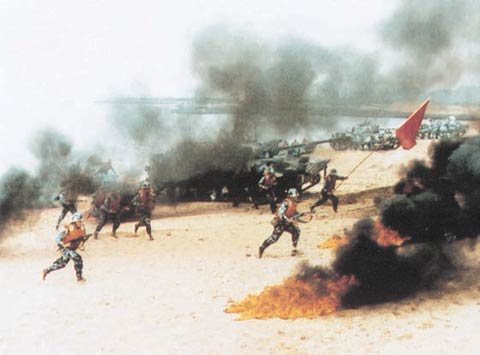 |
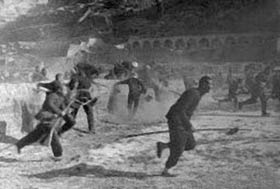 |
| Communism relies on force and violence for its survival. Conflict and war are intrinsic elements of communism. |
Maintaining that conflict is the key to development is a step in the direction of endless bloodshed. Followers of such ideologies will be in constant conflict, oppress each other and spill one another's blood (all in the name of progress). Human feelings upheld by religion (such as love, respect, sacrifice and sharing) disappear entirely, together with any possibility of peace and security. In fact, communist philosophy teaches that virtues such as these actually hold a society back. Mao, who brought this philosophy to China, left behind him some 60 million dead, tens of millions of people who had suffered torture, and a ruthless society.
However, the real contradictions and opposites that exist do not justify savagery and slaughter. Opposites exist everywhere: Day and night, dark and light, hot and cold, good and bad. Yet these have been created to emphasize the beauty of the world and to allow moral virtues such as compassion, peace and forgiveness to emerge. The same thing applies to the world of ideas. The fact that people think or believe differently is no reason for them to ruthlessly slaughter each other. Allah commands people to behave with kindness, even to their enemies, and to speak good words to people. All contradictions can be resolved in an atmosphere of peace and toleration by people who possess the reason and good conscience that Qur'anic morality brings with it.
Communism, however, maintains the exact opposite. In fact, when conflict, which is one of the most important components of communism, joined forces with Darwinist thought, which regards human beings as a species of animal, the result was the deaths of millions of people and the ruining of many more lives. That is why the policies of Mao and his followers were not changed by the sufferings they caused their people, whom they regarded as just a herd of animals.
"A good action and a bad action are not the same.
Repel the bad with something better and, if there is enmity between you and someone else, he will be like a bosom friend."
(Surah Fussilat: 34)
The Darwinist world view which caused Mao to regard those who opposed communism as animals is emphasized in the book China and Charles Darwin by James Reeve Pusey, a historian from Harvard University:
Mao Tse-Tung in an angry moment (as late as 1964) swore that "all demons shall be annihilated." He dehumanized his enemies, partly in traditional hyberbole, partly in Social Darwinian "realism." Like the Anarchists, he saw reactionaries as evolutionary throwbacks, who deserved extinction. The people's enemies were non-people, and they did not deserve to be treated as people.3
Mao's own words confirmed those of Pusey. One of the slogans of the founder of Red China at that time was "The basis of Chinese socialism rests on Darwin and the theory of evolution."4
The Muslims of East Turkestan came to be one of those societies that Mao, inspired by the Darwinist World view, thought had no right to "be treated as human." The reason was because the beliefs of the people of East Turkestan led them to fiercely oppose communism. However, their rightful protest was put down with utter ruthlessness and as a result millions of its children have been martyred by the communist regime. East Turkestan is still living under this repression. Hundreds of thousands of Muslims have been tortured in Chinese prisons, cast out of their homes, and obliged to leave their land.
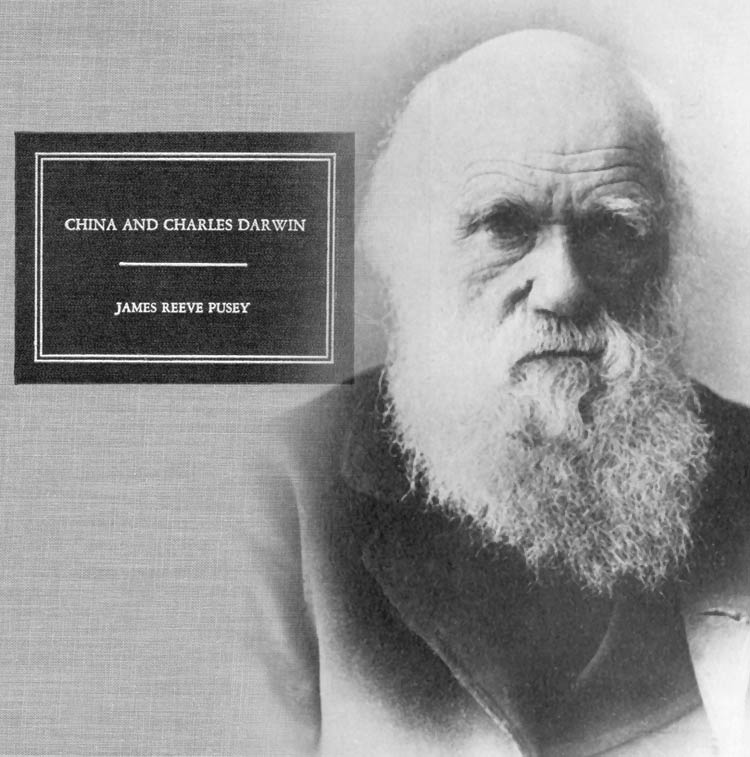 |
| As Mao himself confessed, the most important ideological support of the communist regime in China is Darwin's theory of evolution. In his book China and Charles Darwin, the Harvard University historian James Reeve Pusey describes the great influence of Darwinism in China and how it prepared the intellectual foundations of communism. |
1. A Remarkable Woman is Suppressed," The Guardian, "March 15, 2000 ![]()
2. Jonathan Mirsky, "Revolution's Dark Legacy," Asiaweek, Vol. 27, No. 2, January 19, 2001 (emphasis added) ![]()
3. James Reeve Pusey, China and Charles Darwin, p. 455 (emphasis added) ![]()
4. M. Mehnert, Kampf um Mao's Erbe, Deutsche Verlags-Anstalt, 1977 (emphasis added) ![]()